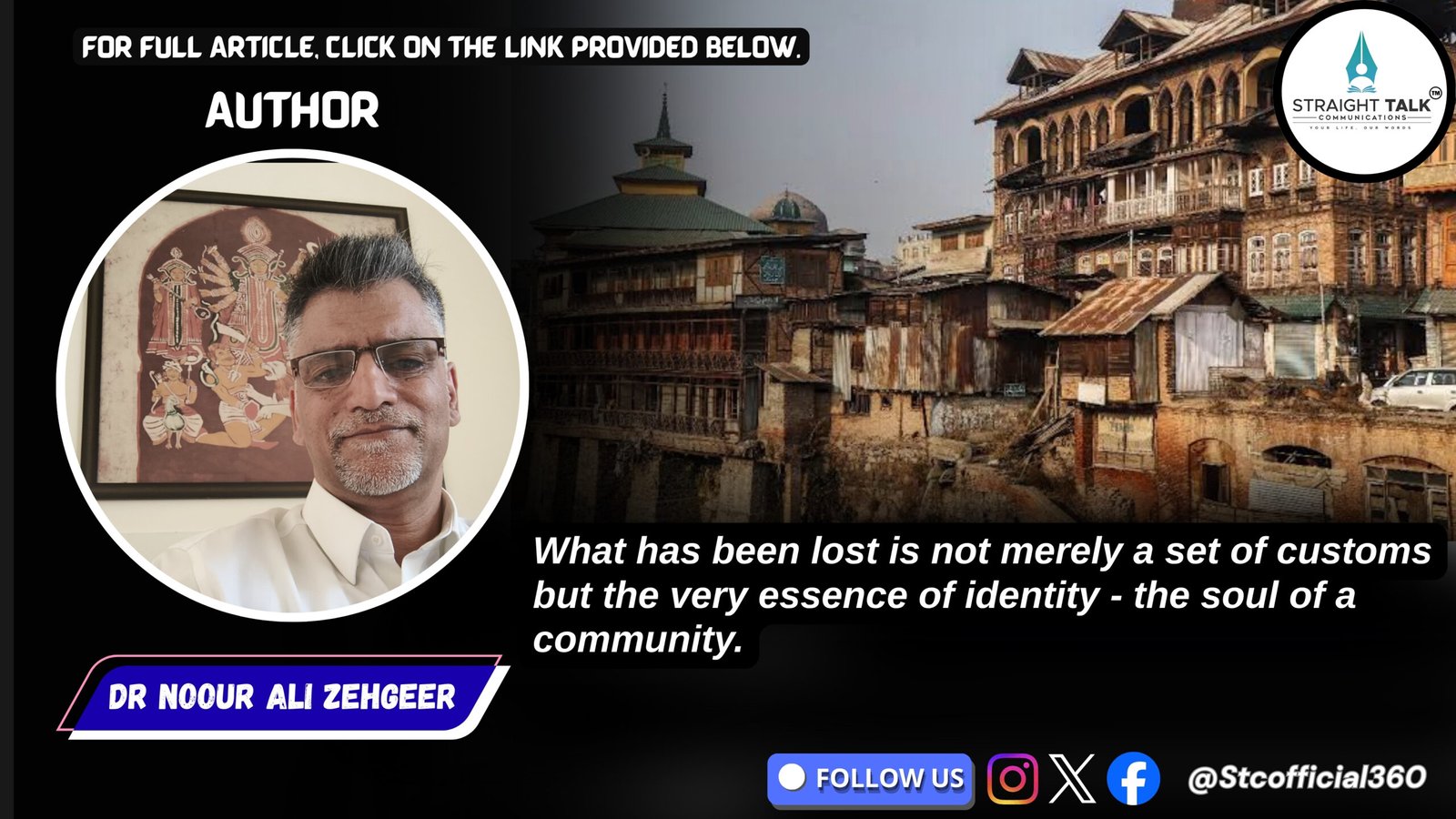Downtown Srinagar Losing Togetherness

What has been lost is not merely a set of customs but the very essence of identity – the soul of a community.
Dr Noour Ali Zehgeer
There was a time when Srinagar’s Shehr-e-Khaas—its historic Downtown—was not just a cluster of lanes, houses, and mosques, but the very heart of Kashmiri life. Its narrow alleys, age-old wooden homes, bustling courtyards, and centuries-old shrines told stories of a society bound not by wealth but by affection, dignity, and a deep sense of belonging. The Muslims and Kashmiri pandits will tease, love and celebrate festivals together.Not only this they will grieve when anyuntoward incident will happen in their vincity
Though homes were modest and resources limited, hearts were generous. Neighbours were family, elders were guides, and children belonged to the whole community. The people of Shehr-e-Khaas lived by unwritten codes of compassion and shared responsibility, weaving a fabric of life that was richer than any material comfort.
A Circle of Care
In those days, society itself was the guardian of its people. Neighbours looked after one another without hesitation. An elder stopping a child on the street to ask where they were headed or how their parents were doing was never considered interference—it was concern born of love. One of the most cherished customs was the sharing of food. Whenever a household cooked Tehri, Halwa, Gaadi, Paachi, Houk Suen, or the winter delicacy Harisa, plates would travel across doorsteps. It wasn’t a ritual of courtesy but a heartfelt declaration: “You are part of us.” Joys were celebrated together, sorrows carried collectively—no one suffered or rejoiced in isolation.
The People’s Meeting Grounds
Beyond the household, the spirit of Shehr-e-Khaas thrived in its gathering spots—the waani pend, Kander Waan, Naid Waan, and the ever-warm public hamams. These spaces were more than marketplaces or meeting corners; they were neighbourhood parliaments.
Here, elders and youth, rich and poor, debated politics, shared news, and solved disputes. Conflicts were resolved not through documents and courts, but through honest conversations guided by respected elders. Their words held authority because they were rooted in fairness, not power.
The Moral Compass of Elders
The elders of Shehr-e-Khaas were the moral anchors of society. They weren’t feared but respected—guardians of wisdom who gently guided, corrected, and maintained balance. Disputes, whether within families or between neighbours, were resolved with dignity and fairness, preventing bitterness from taking root. Women, too, had a quiet but powerful role. If unrest surfaced in a household, the women of the locality would intervene with compassion, offering counsel or collective support. Their watchfulness ensured that no woman’s pain went unnoticed, no family’s dignity collapsed in silence.
A Childhood Raised by All
In Shehr-e-Khaas, every child belonged to the community. If a youngster misbehaved, any elder could correct them, and parents never objected. On the contrary, they welcomed this collective upbringing, knowing it shaped children into respectful and responsible adults. To disrespect an elder was not just a personal flaw—it was a disgrace to one’s family name.
Quiet Acts of Compassion
The poor and the distressed were never abandoned. If someone lost work, fell ill, or faced hardship, help arrived silently—meals delivered at the door, money slipped discreetly into a hand, support extended without a word. The dignity of the person in need was preserved, and no one was left to struggle alone.
The Power of Presence
Perhaps the most striking feature of life then was the value placed on presence. Relatives, friends, and neighbours visited in person to share joy or grief. A hand on the shoulder, a cup of Kehwa or Noon Chai, a few words—or even just silence—spoke more than today’s hurried phone calls or WhatsApp messages ever could. Bonds were strengthened face-to-face, over shared bread and heartfelt conversations.
The Fading Warmth
But today, those golden echoes are disappearing. The same streets that once rang with greetings, laughter, and concern now feel quiet and withdrawn. People retreat into their private lives, celebrations are confined within walls, and grief often goes unnoticed. Disputes that once ended with the wisdom of elders now land in impersonal courtrooms. The gentle oversight of neighbourhoods has weakened. Respect for elders is diminishing, and children are growing up without experiencing the collective love that once nurtured them. What remains is a society more isolated, colder, and lonelier.
The Lost Soul of a City
Shehr-e-Khaas was never just a place—it was an emotion, a living example of unity, compassion, and shared values. Today, those traditions survive only in fading memories, carried by the voices of the old who recall them with moist eyes.
As material comforts have multiplied, hearts have contracted. Big homes now shelter lonely lives. Streets that once celebrated life together echo only with hurried footsteps of strangers.
What has been lost is not merely a set of customs but the very essence of identity—the soul of a community that once thrived on love, trust, and togetherness.
A Call to Remember
Perhaps the stories of those golden days can remind us of what we have lost. Perhaps they can inspire us to reclaim the warmth of neighbourhood bonds, to once again make hearts bigger than homes, and to let the lanes of Shehr-e-Khaas resound with greetings, laughter, and the wisdom of its people.








I read all the content with very much interest and found myself a part of whatever the author has tried to communicate. I was emotionally touched by the clear picture painted by the author and it took me down the memory lane, lost in thoughts roaming the lanes of my old downtown where I was born and brought up. There is no doubt that we have lost that love and togetherness which once was the essence of our loved downtown and I feel very bad when I see all of it vanishing beyond any hope of regaining it. It reminds me of a few lines of a song by Pankaj Udhaas: “Dukh sukh tha ek sabka, apna ho ya begaana;
Ek woh bhi tha zamana, ek yeh bhi hai zamana.
Even after 35 five years of separation from my motherland, sometimes I still feel roaming around in my lanes and bylanes in my dreams and come to terms with the reality once I wake up. Praying to God to bless all of us.